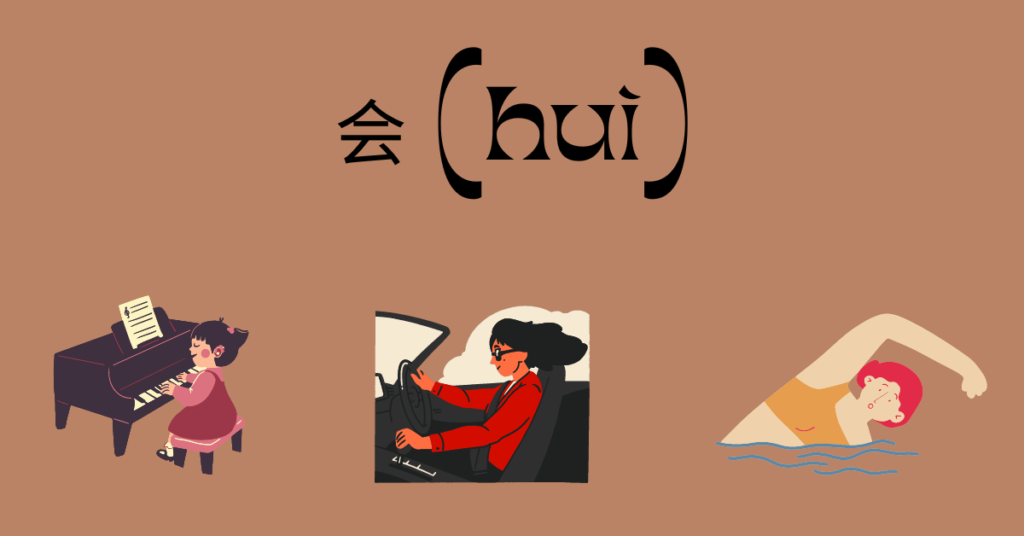
Here’s a detailed explanation of the common Chinese grammar pattern 会 (huì) to indicate ‘know how to’, along with examples:
会 (huì) to indicate ‘know how to’:
- Pronunciation: In this usage, 会 (huì) is pronounced as “huì” with the fourth tone.
- Usage: 会 (huì) is used to indicate the ability or skill of knowing how to do something. It is often used with verbs to express the capability or proficiency in performing a particular action.
- Example: 我会说汉语 (wǒ huì shuō Hànyǔ) – “I know how to speak Chinese.”
This pattern is commonly used in Chinese to express one’s competence or skill in a specific area or activity. Here are a few more examples:
- 他会弹钢琴 (tā huì tán gāngqín) – “He knows how to play the piano.”
- 她会开车 (tā huì kāichē) – “She knows how to drive.”
- 我会游泳 (wǒ huì yóuyǒng) – “I know how to swim.”
By using 会 (huì) to indicate ‘know how to’, you can convey the ability or proficiency in performing a specific action or skill in Chinese. It is a useful pattern to describe one’s competence or expertise in various areas.
Dialogue
Person A: 你会说英语吗?
(Do you know how to speak English?)
(Nǐ huì shuō yīngyǔ ma?)
Person B: 会!我在学校学了很多年英语。
(Yes, I do! I have been learning English for many years at school.)
(Huì! Wǒ zài xuéxiào xuéle hěnduō nián yīngyǔ.)
Person A: 太棒了!你能帮我练习英语对话吗?
(That’s great! Can you help me practice English conversations?)
(Tài bàngle! Nǐ néng bāng wǒ liànxí yīngyǔ duìhuà ma?)
Person B: 当然可以!我们可以一起练习对话。
(Of course! We can practice conversations together.)
(Dāngrán kěyǐ! Wǒmen kěyǐ yīqǐ liànxí duìhuà.)
Person A: 谢谢你的帮助,我想提高我的口语水平。
(Thank you for your help. I want to improve my spoken English.)
(Xièxiè nǐ de bāngzhù, wǒ xiǎng tígāo wǒ de kǒuyǔ shuǐpíng.)
Person B: 没问题,我们一起努力,你会越来越好的。
(No problem. Let’s work hard together, and you will get better and better.)
(Méi wèntí, wǒmen yīqǐ nǔlì, nǐ huì yuè lái yuè hǎo de.)
In this dialogue, the verb “会” (huì) is used to indicate the ability to speak English. Person A asks if Person B knows how to speak English, and Person B confirms their ability by saying “会.” Person A expresses their desire to practice English conversations and asks if Person B can help, using “能” to inquire about their capability. Person B agrees to help and encourages Person A to improve their spoken English. The use of “会” signifies the ability to perform a specific skill, in this case, speaking English.
Exercise
- Create your own sentence(s) using 会 (huì).